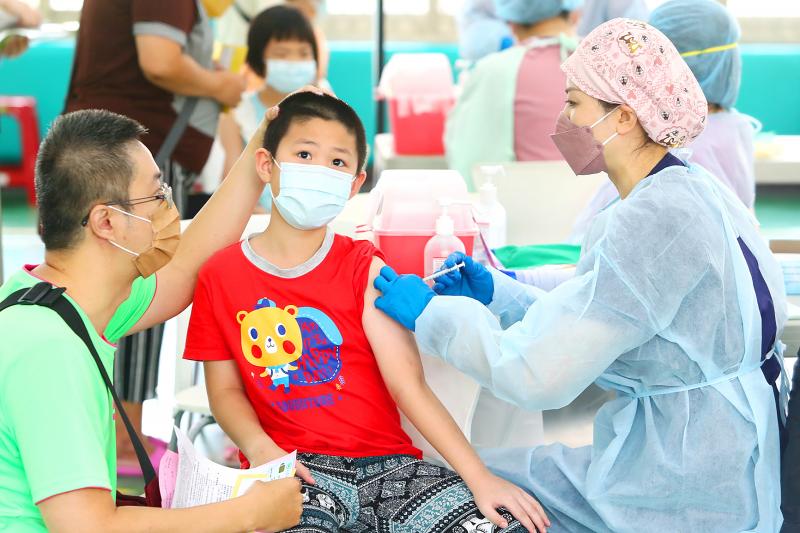COVID-19 vaccinations for children six months to five years old are expected to start next month, the Central Epidemic Command Center (CECC) said yesterday, one day after emergency use authorization (EUA) was granted to Moderna’s COVID-19 vaccine for children in the age group.
The Advisory Committee on Immunization Practices is to meet in the next few days to discuss vaccination procedures, said Centers for Disease Control Deputy Director-General Philip Lo (羅一鈞), the CECC’s acting spokesman and medical response division deputy head.
The first batch of the Moderna vaccines for children six months to five years old is expected to arrive next month, Lo said.

Photo: CNA
As for whether Pfizer-BioNTech’s COVID-19 vaccine might be made available for children under the age of five, Lo said the CECC is still waiting for technical information from the manufacturer about its use for the age group.
The Food and Drug Administration (FDA) said that the Moderna vaccine would be administered in two 0.25 milliliter doses, each containing 25 micrograms of mRNA, with a minimum interval of 28 days.
In comparison, each dose given to people aged 12 or older contains 100 micrograms of mRNA, with 50 micrograms for children aged six to 11.
Moderna said that its interim results from a study for the six months to five years age group showed a robust neutralizing antibody response consistent with that of young adults, even at the lower 25 microgram dose.
Taiwan began offering the Moderna COVID-19 vaccine to children aged six to 11 on May 2, and on May 25 started the rollout of the Pfizer-BioNTech COVID-19 vaccine for children aged five to 11.
Meanwhile, the FDA on Friday also granted EUA for the Novavax COVID-19 vaccine for adults.
The vaccine is for people aged 18 or older with a regimen of two 0.5 milliliter doses given three weeks apart, the FDA said in a statement after a meeting to review Novavax quality, safety and efficacy data.
Based on an overall assessment and considering urgent domestic public health needs, experts at the meeting agreed to approve imports of Novavax vaccines in accordance with Taiwan’s pharmaceutical laws, the FDA said.
In clinical trials involving people aged 18 or older, the most common adverse reactions were tenderness or pain at the injection site, fatigue, muscle pain, headaches, general weakness, joint pain, and nausea or vomiting, with severity ranging from mild to moderate, the FDA said.
It would continue to monitor domestic and overseas vaccination safety alerts, while analyzing and evaluating data related to adverse vaccine events, and implement a safety monitoring mechanism to ensure the safety of the vaccine for the public, the FDA said.
Taiwan is likely to receive a shipment of Novavax through the COVAX global vaccine sharing initiative next month, Lo said.
The latest CECC data showed that 91.15 percent of Taiwan’s population has received at least one dose of a COVID-19 vaccine.
The data showed that 82.6 percent has had at least two doses and 69.24 percent has received a booster shot.

The US government has signed defense cooperation agreements with Japan and the Philippines to boost the deterrence capabilities of countries in the first island chain, a report by the National Security Bureau (NSB) showed. The main countries on the first island chain include the two nations and Taiwan. The bureau is to present the report at a meeting of the legislature’s Foreign Affairs and National Defense Committee tomorrow. The US military has deployed Typhon missile systems to Japan’s Yamaguchi Prefecture and Zambales province in the Philippines during their joint military exercises. It has also installed NMESIS anti-ship systems in Japan’s Okinawa

‘WIN-WIN’: The Philippines, and central and eastern European countries are important potential drone cooperation partners, Minister of Foreign Affairs Lin Chia-lung said Minister of Foreign Affairs Lin Chia-lung (林佳龍) in an interview published yesterday confirmed that there are joint ventures between Taiwan and Poland in the drone industry. Lin made the remark in an exclusive interview with the Chinese-language Liberty Times (the Taipei Times’ sister paper). The government-backed Taiwan Excellence Drone International Business Opportunities Alliance and the Polish Chamber of Unmanned Systems on Wednesday last week signed a memorandum of understanding in Poland to develop a “non-China” supply chain for drones and work together on key technologies. Asked if Taiwan prioritized Poland among central and eastern European countries in drone collaboration, Lin

NO CONFIDENCE MOTION? The premier said that being toppled by the legislature for defending the Constitution would be a democratic badge of honor for him Premier Cho Jung-tai (卓榮泰) yesterday announced that the Cabinet would not countersign the amendments to the local revenue-sharing law passed by the Legislative Yuan last month. Cho said the decision not to countersign the amendments to the Act Governing the Allocation of Government Revenues and Expenditures (財政收支劃分法) was made in accordance with the Constitution. “The decision aims to safeguard our Constitution,” he said. The Constitution stipulates the president shall, in accordance with law, promulgate laws and issue mandates with the countersignature of the head of the Executive Yuan, or with the countersignatures of both the head of the Executive Yuan and ministers or

CABINET APPROVAL: People seeking assisted reproduction must be assessed to determine whether they would be adequate parents, the planned changes say Proposed amendments to the Assisted Reproduction Act (人工生殖法) advanced yesterday by the Executive Yuan would grant married lesbian couples and single women access to legal assisted reproductive services. The proposed revisions are “based on the fundamental principle of respecting women’s reproductive autonomy,” Cabinet spokesperson Michelle Lee (李慧芝) quoted Vice Premier Cheng Li-chiun (鄭麗君), who presided over a Cabinet meeting earlier yesterday, as saying at the briefing. The draft amendment would be submitted to the legislature for review. The Ministry of Health and Welfare, which proposed the amendments, said that experts on children’s rights, gender equality, law and medicine attended cross-disciplinary meetings, adding that